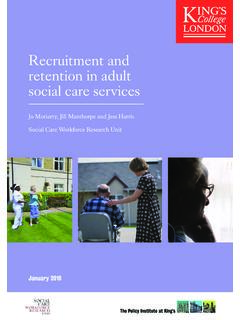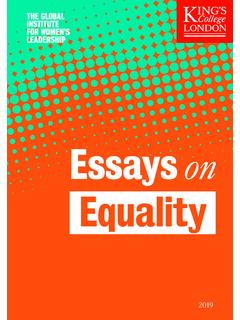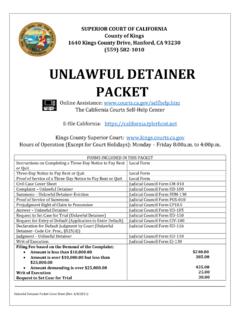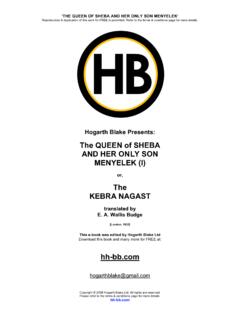Transcription of Example personal statements - King's College London
1 Example personal statements Take a look at our Example personal statements below to give you an idea of the structure and type of content that makes a good personal statement. Please note the examples provided are purely for guidance only and should not be copied, adapted or referenced in any way. UCAS operates a Similarity Detection Service whereby all personal statements submitted to UCAS are screened by their similarity detection system, Copycatch to prevent plagiarism. Any level of similarity of 30% or more are reviewed by members of the UCAS Verification Team and further action will then be taken. Business Management: I have always been fascinated by business and the impact it has on the world we live in. To gain a better understanding of business, I organised work experience with three different businesses: [ Example one], [ Example two] and [ Example three].
2 At the [ Example one], I was given an opportunity to analyse a variety of business ideas and judge whether they were worth investing in. The [ Example two] was the most interesting for me as I was exposed to the world of buying and selling; equities as well as a variety of other commodities. The firm was interested in investing in container ships and I was amazed at how volatile the prices were. I also gained some work experience with [ Example three]. I found this large firm intriguing, as it specialises in many areas from real estate to multi million pound investments in equities. My favourite subject at school is Economics. I enjoy microeconomics and the insights this provides as to how businesses are run. For Example , I now understand the difference between fixed and variable costs and how this impacts on business decisions.
3 The course introduced me to many basic business terms, opening my eyes to a whole new language that I look forward to learning more about. Two of my favourite business books are Alan Sugar's autobiography and Naomi Klein's No is Not Enough. Sugar's book provides a fascinating insight into the life of an entrepreneur and I particularly enjoyed his advice on how to set up and successfully manage businesses. Klein's book focuses on the link between politics and business seen through the life of Donald Trump and I was particularly taken by her argument that he is using his presidency to enhance his brand image. I enjoyed a debate on whether the government should have bailed out the banks. I learnt the importance of the banking sector to the economy and the need to ensure that banks are well regulated I am undertaking an EPQ on South Africa and the role that Mandela played in the abolition of apartheid.
4 My EPQ has required significant dedication and independent learning as well as perseverance. My EPQ research demonstrated my ability to think critically, analyse research recourses and develop lines of argument, articulating these in a clear written structure. I took advantage of a trip to South Africa by initiating an interview with an ex-political prisoner on Robben Island which forms an integral part of my research as I often use direct quotes from him to emphasise certain ideas. Since the age of eleven I have played sport to a high level representing my county at both tennis and cricket. Therefore, I know what it takes to achieve and sustain high levels of success. Cricket has taught me how to work in a team, which is important for group projects at University and for business.
5 I completed a Sports Leadership and a Speaking with Confidence course, both of which enhanced my natural ability to work well in teams. I volunteered to speak at our school's Open Day and felt that I was fluent and articulate. I am interested in studying a business-related degree because I believe that business should be run for the benefit of all in society. One of the biggest issues facing business and politics today is the increasing divide between rich and poor. According to Oxfam, the wealth of the richest 8 people in the world is the same as the poorest 50%. This needs to change. I recently entered an Economics essay competition in which I argued for greater fairness in income distribution as I strongly feel that the world needs to be a fairer place.
6 Therefore, I would love to study on this course not only to further my own career but also to bring values fairness and equality to the world of business. Law: I have a love for words. Words are used in law in a way that is incomparable to any other discipline; the interpretation of words in a courtroom can condemn someone to prison or set them free. The vital importance attached to words has nurtured my interest in the law and is one of the reasons I look forward to studying it. After reading Wacks' 'Law: A Very Short Introduction' and 'What About Law?' by Barnard, O'Sullivan and Virgo, I was fascinated by the development of the Anglo-Welsh legal system, and began to see it as perhaps our most undervalued export throughout history. My interest in the technicalities of some of the cases related in 'What About Law', notably the debate over the value of nine inches of swimming pool depth in Ruxley v.
7 Forsyth, led me to read 'Is Eating People Wrong?' by Hutchinson. Amongst other cases, the book introduced me to the eponymous case of R v. Dudley and Stephens. This exhibits how the Queen's Bench Division was mindful of the potential consequences of establishing a necessity defence for murder, demonstrating the power that one court's decision has to affect the entire legal field. Whilst recognising the view as symptomatic of its era, I disagreed with Lord Coleridge's thundering proclamation that it may sometimes be a man's duty to die: his argument is undermined by holding the 'reasonable man' ubiquitous in law to unreasonable moral standards. The online course 'Law for Non-Lawyers' by Monash University gave me a broad insight into criminal, contract, tort and intellectual property law.
8 My interest in the criminal law drove me to complete the online course 'Crime, Justice and Society' by Sheffield University, giving me a holistic overview of criminal justice proceedings, including the disproportionate effects of imprisonment on women, and suggesting some alternatives to traditional sanctions. A week of work experience in the pensions department of [company 1] allowed me to understand a specialised area of the law and apply it to real-world situations, a skill further developed by a week at [company 2] in-house legal department in relation to the commercial law, notably how mergers and acquisitions law underpins free market competition. The additional experience of drafting a settlement agreement reinforced the imperative that the words I typed had to be clear and final.
9 The most valuable lesson, however, came when I was handed a contract of several hundred pages and asked to look for one critical detail, which taught me the importance of meticulousness. I recently visited the Supreme Court to witness [A] v [B], a very technical Scottish case. Watching the justices decoding the details of the case using comparisons to garden fences and exploding factories reassured me that even at the highest level, the law must remain accessible. Within school, I have regularly attended law society, improving my debating skills when discussing an area of the law. One of the liveliest debates I took part in concerned the judicial retention elections which take place in some American states. I am also scheduled to take part in the Bar Mock Trial Competition as a defence barrister, and, in the course of assembling my case, I have learned about the subtlety involved in court proceedings, such as the ability to portray a defendant in a certain way using the examination-in-chief.
10 Serving as a House Captain in Year 13 has forced me to stay organised and work to a strict time limit, for Example when organising events. Through the composition of speeches, my writing has become clearer and more persuasive. Playing 1st and 2nd XV rugby for my school also allowed me to work for and lead a team under heavy pressure. Personally, caring for my sister, who has been ill for several months, has forced me to sacrifice time with my friends and has maintained my focus in life on the areas which I consider to be truly important. Studying the law, I hope, will be one. Comparative Literature Studying English at A Level has allowed me to gently dip, but not too deep into literature. I look forward to immersing myself fully at degree level. I am a creative, conscientious student and I have a whole-hearted commitment to broadening my understanding of our literary heritage.















